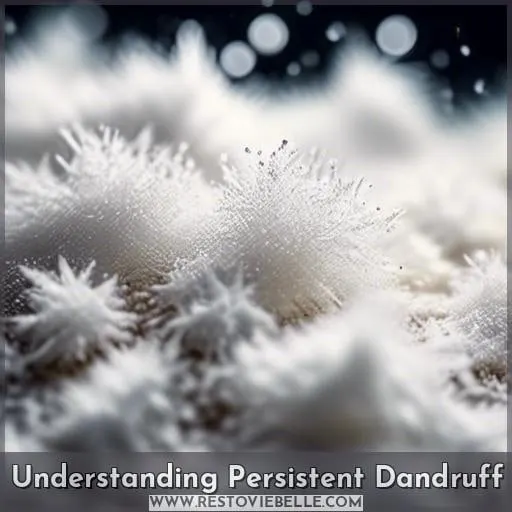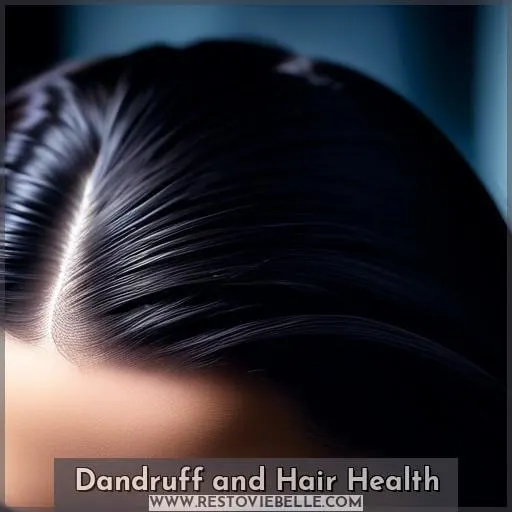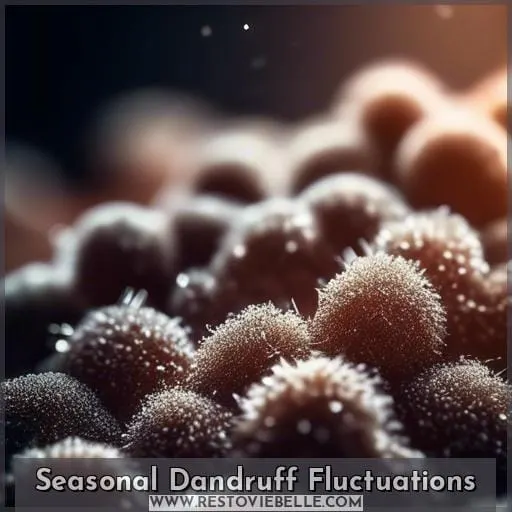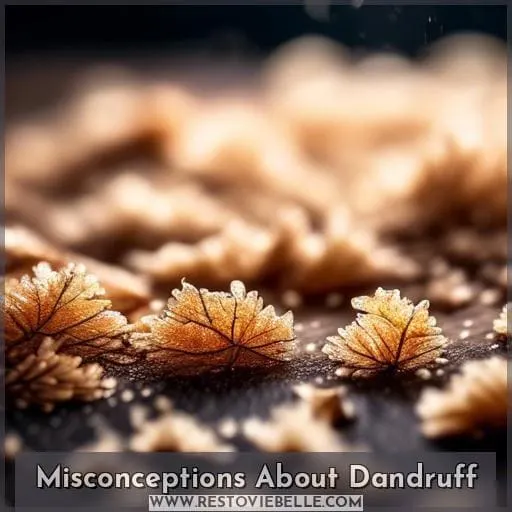This site is supported by our readers. We may earn a commission, at no cost to you, if you purchase through links.
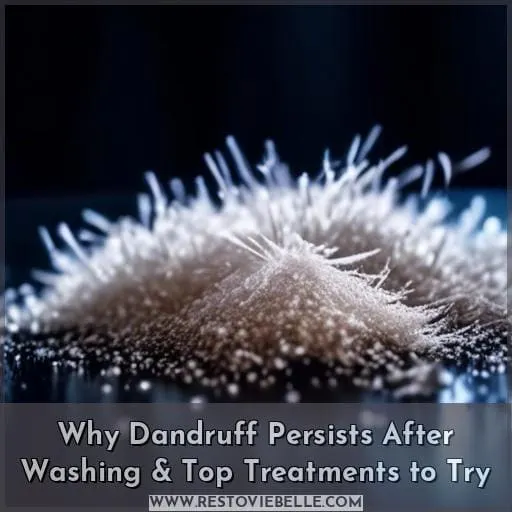 Dandruff can be a stubborn and frustrating issue, persisting even after thorough hair washing. It’s not just about cleanliness; various factors contribute to those persistent flakes.
Dandruff can be a stubborn and frustrating issue, persisting even after thorough hair washing. It’s not just about cleanliness; various factors contribute to those persistent flakes.
From yeast overgrowth and an oily or irritated scalp to skin conditions like psoriasis or eczema, understanding the root cause is key.
If you’re battling dandruff despite regular washing, it’s time to explore targeted treatments. This guide delves into the reasons behind persistent dandruff and introduces top treatments to try, ensuring your scalp health is in the best possible condition.
Table Of Contents
- Key Takeaways
- Understanding Persistent Dandruff
- 5 Best Dandruff Treatments
- Dandruff and Hair Health
- Seasonal Dandruff Fluctuations
- Misconceptions About Dandruff
- When to Consult a Professional
- Frequently Asked Questions (FAQs)
- Can certain hairstyles or hair treatments exacerbate dandruff symptoms?
- Is there a link between water quality or hardness and persistent dandruff?
- How does the frequency of hair coloring or chemical treatments impact dandruff?
- Are there specific vitamins or supplements that can help reduce dandruff when included in one’s diet?
- Can changes in environmental factors, such as moving to a different climate or exposure to pollution, trigger dandruff?
- Conclusion
Key Takeaways
- Infrequent hair washing can lead to a buildup of oils and dead skin cells, which can cause dandruff, even after the hair is washed.
- Using the wrong hair care products can irritate the scalp and contribute to dandruff; it’s important to use products that are suitable for one’s specific scalp condition.
- Stress can trigger or exacerbate dandruff, so managing stress levels might help reduce dandruff symptoms.
- Dandruff can be persistent if the shampoo used does not effectively address the scalp condition; medicated shampoos containing ingredients like pyrithione zinc, selenium sulfide, or salicylic acid may be necessary for treatment.
Understanding Persistent Dandruff
If you’re still seeing dandruff flakes after washing your hair, it’s understandable to feel a bit frustrated. It’s important to know that dandruff can be stubborn, often due to factors like yeast overgrowth on your scalp, not washing your hair often enough, or having an oily and irritated scalp.
Conditions like psoriasis or eczema can also play a role. Finding the right balance in your hair care routine and possibly seeking medical advice for underlying skin conditions can help manage your dandruff more effectively.
Yeast Overgrowth on Your Scalp
Feeling like you’re battling an invisible flake monster? It might be a yeast overgrowth, specifically Malassezia globosa, causing your dandruff drama.
This pesky fungus loves oily environments, leading to scalp irritation and those unwanted white flakes. Don’t fret! Anti-dandruff shampoos with antimicrobial ingredients can be your knight in shining armor, turning the tide against this microscopic menace.
Not Washing Hair Often Enough
If you’re still seeing dandruff after washing your hair, it might be due to not shampooing often enough, which can lead to oil and hair product buildup on your scalp. This buildup can create an environment that exacerbates dandruff. To maintain scalp health and manage dandruff, it’s important to choose the right shampoo type and adjust your hair care routine accordingly.
For instance, using a shampoo with active ingredients like ketoconazole, salicylic acid, selenium sulfide, or zinc pyrithione can help address the overproduction of oil and reduce flakiness.
Additionally, your showering habits play a role; washing your hair too infrequently can contribute to dandruff, while over-washing can lead to a dry scalp. It’s also essential to use the correct washing technique, such as focusing on the scalp and avoiding harsh scrubbing, which can irritate the skin and worsen dandruff.
Some people find natural remedies like apple cider vinegar helpful for maintaining scalp health, as it can balance the scalp’s pH and has natural antifungal properties.
Oily/Irritated Scalp
An oily scalp can be a real slippery slope, leading to that not-so-fresh feeling and the dreaded dandruff.
- Embrace the Balance: Your scalp’s like a well-oiled machine—literally. A bit of oil is good, but too much and you’re in slick city. Aim for that happy medium.
- Shampoo Smarts: Pick a shampoo that’s tough on oil but gentle on your hair. And remember, washing too much can backfire, making your scalp work overtime pumping out more oil.
- Home Remedies Rock: Aloe vera and rosemary oil aren’t just for show, they’re scalp superheroes. They soothe, reduce dandruff, and keep your hair’s oil levels in check.
- Stress Less: Believe it or not, stress can turn your scalp into an oil slick. So chill out, maybe meditate or do some yoga. Your scalp (and sanity) will thank you.
Skin Conditions Like Psoriasis or Eczema
When your scalp’s as unpredictable as a weather forecast, skin conditions like psoriasis or eczema could be the culprits behind your dandruff drama. These aren’t just flaky nuisances; they’re signs your scalp’s crying out for help amidst dry air and internal storms of irritation.
| Condition | Trigger | Solution |
|---|---|---|
| Psoriasis | Dry air | Omega-3 fatty acids |
| Eczema | Allergies | Dermosoft Decalact MB |
| Seborrheic Dermatitis | Yeast overgrowth | Avoid harsh styling products |
5 Best Dandruff Treatments
If you’re still noticing dandruff after washing your hair, don’t worry; there are effective treatments available.
Products like Scalpicin Scalp Itch Relief Maximum and Neutrogena Anti-Dandruff Shampoo are designed to tackle persistent flakes and itchiness.
Let’s explore how these and other top treatments can help you achieve a healthier scalp.
1. Scalpicin Scalp Itch Relief Maximum
If you’re scratching your head over persistent dandruff, Scalpicin Scalp Itch Relief Maximum might just be your ticket to comfort. This little bottle packs a punch with 3% Salicylic acid, aiming to calm that itch associated with pesky scalp conditions.
It’s fragrance-free and greaseless, so your hair won’t look like you’ve been in a food fight. And while it’s a bit on the pricey side, many find it’s worth every penny for the relief it brings.
- Fragrance-free and non-greasy, keeping your hair looking clean
- Contains 3% Salicylic acid to help relieve scalp itch
- Won’t mess with your hair’s appearance or feel
- Some users find it expensive
- Packaging issues reported, such as leaking bottles
- Doesn’t claim to cure itch, only to relieve it
2. Neutrogena Anti-Dandruff Shampoo 16oz
View On Amazon
If you’re wrestling with dandruff that just won’t wave the white flag, Neutrogena’s Anti-Dandruff Shampoo could be your scalp’s new best friend. Imagine this: just one wash and you’re on your way to flake-free days. Thanks to coal tar extract, this shampoo doesn’t clock out after you’ve rinsed; it keeps fighting the flake battle for hours.
- Starts working from the first use
- Coal tar extract continues to work post-rinse
- Recommended by dermatologists for daily use
- May have a strong medicinal odor
- Requires caution with sun exposure after use
- Contains chemicals known to California to cause cancer
3. Klorane Peony Soothing Relief Shampoo
If your scalp’s been throwing a flaky fit, Klorane’s Peony Soothing Relief Shampoo might just be the peacekeeper you need. Crafted in France, this gentle cleanser is like a calming peony petal bath for your head, offering a much-needed hug to those with sensitive, itchy scalps prone to dandruff.
Its pH-balanced formula is as kind to your hair as a soft breeze, and with no SLS, parabens, or silicones, it’s as pure as your intentions on a Monday morning.
- Soothes sensitive scalps with peony extract
- PH-balanced for gentle cleansing
- Free from SLS, parabens, and silicones
- May not be suitable for very oily scalps
- Some may prefer a medicated shampoo for severe dandruff
- Fragrance may not appeal to everyone
4. Head Shoulders Clinical Dandruff Shampoo Twin
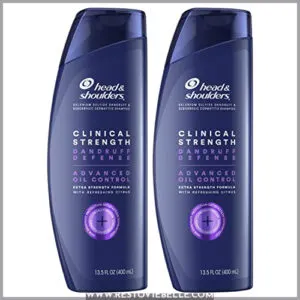
If you’re wrestling with stubborn dandruff, Head & Shoulders Clinical Dandruff Shampoo Twin might just be your knight in shining armor. This powerhouse packs a punch with 1% Selenium Sulfide, giving you that prescription-strength defense against the flaky foes.
Imagine saying goodbye to those pesky flakes and oil with just a wash or two a week – talk about a game-changer! Plus, it comes in a handy twin pack, so you’re always prepared for battle.
- Contains 1% Selenium Sulfide for potent dandruff control
- Clinically proven to provide significant flake reduction
- Comes in a convenient twin pack for ongoing treatment
- The citrus fragrance mightn’t be everyone’s cup of tea
- May not work for all users, as individual results can vary
5. Aveeno Oat Milk Hydrating Shampoo
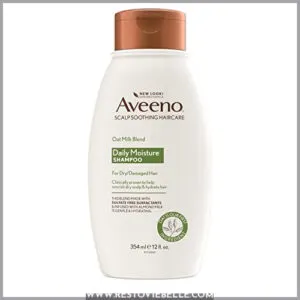
If your scalp’s been throwing a tantrum with dandruff, despite your best efforts, it’s time to bring in the big guns – or in this case, the gentle touch of Aveeno Oat Milk Hydrating Shampoo. Imagine wrapping your hair and scalp in a soothing blanket of oat and almond milk, known for their calming properties.
This shampoo is like a spa day for your scalp, minus the hefty price tag. It’s free from the harsh stuff (sulfates, parabens, and dyes), making it a knight in shining armor for all hair types.
- Infused with natural oat and almond milk for soothing hydration
- Free from sulfates, parabens, and dyes, making it gentle for daily use
- Clinically proven to nourish hair and soothe the scalp
- May not target severe dandruff as effectively as medicated options
- Some users might prefer a stronger scent
- Results can vary depending on hair type and condition
Dandruff and Hair Health
If you’re struggling with dandruff even after washing your hair, it’s important to understand that you’re not alone, and it’s not a reflection of poor hygiene.
Dandruff can be stubborn, often due to factors beyond just cleanliness, such as a reaction to yeast on your scalp or the overproduction of oil.
Managing dandruff effectively requires the right approach, including possibly changing your hair care routine or seeking specific treatments to address the underlying causes.
Dandruff’s Impact on Hair Shedding
You might be scratching your head (hopefully not too hard!) over why dandruff still plagues you despite regular shampooing.
- Itching can be a real pain, literally. Scratching can irritate your scalp and harm those precious hair follicles.
- A flaky scalp might seem like a snowfall on your shoulders, but it’s not the season to celebrate.
- Your diet and stress levels can be secret culprits behind those pesky flakes.
- Don’t just wash away your worries; consider shampoos with pyrithione zinc, selenium sulfide, or salicylic acid for a targeted attack on dandruff.
Itchy Scalp and Hair Loss
If you’re scratching your head over itchy scalp and hair loss, you’re not alone. Dandruff can be a real mane menace, often leading to hair shedding.
Overdoing it with shampoo might strip your scalp’s natural oils, while underdoing it can leave you flaky.
Try a scalp delight™ detox scrub or a dab of coconut or olive oil for soothing relief.
Seasonal Dandruff Fluctuations
You might wonder why, despite regular hair washing, dandruff persists. Seasonal changes can influence the condition of your scalp.
In winter, the dry air can lead to a flaky scalp, while in summer, sweat and oiliness may exacerbate dandruff issues.
To manage this, consider using specialized dandruff treatments and shampoos that target the underlying causes, such as fungal overgrowth or excess sebum production.
It’s also important to protect your scalp from extreme temperatures and to maintain a balanced diet and stress management routine to help keep dandruff at bay throughout the year.
Winter Dryness and Flaking
As you’ve been battling dandruff, you might’ve noticed that the winter chill brings more than just the need for a cozy sweater—it can also invite a flurry of flakes that’s not the snowy kind. You’re not alone if you find your scalp feeling like a miniature snow globe during these months.
The cold air outside and the dry heat indoors can strip moisture from your skin, including your scalp, leading to dryness and flaking. This is why you might still be asking, Why do I still have dandruff after washing my hair? despite your best efforts.
To combat winter dandruff, it’s essential to keep your scalp hydrated. You might want to swap your regular shampoo for a dandruff shampoo that’s armed with hydrating heroes like dermosoft® decalact mb, a natural antimicrobial that can help keep the dandruff-causing yeast in check.
Remember, while stress and fatigue can exacerbate dandruff, using the right hair products and styling techniques can help manage it. And if you’re tempted to whip up a homemade dandruff remedy, make sure it’s one that won’t irritate your scalp further.
Regular hair washing with the right dandruff shampoo can help maintain a healthy scalp environment and keep those pesky flakes at bay.
Summer Sweat and Oiliness
- Heat Hikes: The mercury’s rise can make that pesky Malassezia globosa fungus on your scalp throw a party, leading to more flakes.
- Sweat Story: Your scalp’s sweat saga can turn into a dandruff drama, as moisture makes the fungus flourish.
- Pollution Problem: More time outdoors means more scalp battles with pollutants, weakening your defenses against dandruff.
- Shampoo Shield: Arm yourself with an instant relief dandruff shampoo like Head & Shoulders, and consider a detox conditioner like Scalp Delight™ to keep oiliness at bay.
Misconceptions About Dandruff
Understanding why dandruff persists even after regular hair washing can be puzzling, but it’s crucial to recognize that dandruff is a complex condition influenced by various factors.
It’s not just about cleanliness; dandruff can be caused by fungal overgrowth, dry skin, or even reactions to hair care products. Moreover, washing your hair too frequently or with harsh shampoos can exacerbate the issue by stripping your scalp of its natural oils, leading to dryness and irritation.
To effectively manage dandruff, it’s essential to identify the underlying cause and choose treatments that address those specific triggers, such as using medicated shampoos or adjusting your hair care routine.
Dandruff Isn’t Necessarily Seasonal
You might think dandruff is a seasonal visitor, showing up with the winter chill or summer sweat, but it’s not that simple.
Dandruff can be a year-round party crasher, and it doesn’t always RSVP. It’s not just about the weather outside; it’s also about what’s happening on your scalp.
Whether it’s the dry air of winter leaving your scalp parched or the summer heat ramping up oil production, dandruff can strike regardless of the season. So, don’t just blame the thermometer if you spot those pesky flakes—dandruff doesn’t always play by the rules of the calendar.
When to Consult a Professional
If you’ve been diligently washing your hair but still find yourself dealing with dandruff, it’s time to consider other steps.
Persistent severe scalp redness and flaking, despite using over-the-counter treatments, signal that it’s time to consult a professional.
A healthcare provider can offer prescription-strength options and pinpoint any underlying issues contributing to your dandruff.
Severe Scalp Redness and Flaking
If you’re battling severe scalp redness and flaking that just won’t quit, even after trying home remedies and over-the-counter solutions, it’s time to dig deeper.
These stubborn symptoms could be the tip of the iceberg, hinting at underlying causes that need a professional’s touch. Don’t just grin and bear it; prescription medication might be the key to calming that tempestuous scalp.
And remember, lifestyle changes can be powerful allies in your fight against flakiness. So, if your scalp’s still throwing a fit despite your best efforts, reach out to a healthcare provider. They’re your partner in this dance, ready to step in with the right moves to get your scalp back in rhythm.
Over-the-Counter Treatments Not Working
When your dandruff laughs in the face of over-the-counter treatments, it’s time to play detective and consider:
- Underlying medical conditions might be the secret culprits.
- Unsuitable hair products could be stirring up trouble.
- Allergic reactions are sneaky suspects.
- Fungal infections and stress are often lurking in the shadows.
Don’t let dandruff control your life; seeking professional advice can turn the tables.
Frequently Asked Questions (FAQs)
Can certain hairstyles or hair treatments exacerbate dandruff symptoms?
Yes, certain hairstyles and hair treatments can indeed exacerbate dandruff symptoms.
Heat styling and chemical treatments can strip the scalp of its natural oils, leading to dryness and flakiness. Additionally, product buildup from styling products can irritate the scalp and worsen dandruff.
It’s crucial to maintain a healthy scalp environment by choosing gentle styling methods and products, and by regularly cleansing the scalp to remove buildup.
Is there a link between water quality or hardness and persistent dandruff?
Yes, there’s a link between water quality, specifically hardness, and persistent dandruff.
Like a thorn in your side, hard water—with its high mineral content—can irritate your scalp, leading to dandruff by drying out your skin and disrupting the natural shedding of skin cells.
How does the frequency of hair coloring or chemical treatments impact dandruff?
Frequent hair coloring or chemical treatments can strip your scalp of protective oils, leaving it vulnerable to dandruff.
The harsh chemicals may cause irritation or allergic reactions, exacerbating dandruff. It’s like walking a tightrope without a net; if your scalp’s already on edge, coloring can push it over, leading to flakiness.
So, if you’re coloring your hair and notice snowflakes on your shoulders, it might be time to switch to a dandruff shampoo that’s safe for colored hair.
Are there specific vitamins or supplements that can help reduce dandruff when included in one’s diet?
Yes, including specific vitamins and supplements in your diet can help reduce dandruff.
Vitamins D, B2, B3, B6, and B7 are associated with a healthy scalp, and their deficiency can increase the risk of dandruff.
Omega-3 fatty acids, found in fatty fish, walnuts, and flaxseed, are also beneficial for maintaining well-hydrated skin and a healthy scalp.
Consuming foods rich in these nutrients or taking supplements can support scalp health and reduce dandruff symptoms.
Can changes in environmental factors, such as moving to a different climate or exposure to pollution, trigger dandruff?
Yes, moving to a different climate or exposure to pollution can indeed trigger dandruff.
Environmental changes like dry air, humidity, and pollution can alter sebum production on your scalp, potentially leading to dandruff flare-ups.
Conclusion
Battling dandruff can feel like climbing a mountain, but remember, you’re not alone in this journey.
If you’re wondering why you still have dandruff after washing your hair, it’s crucial to identify the root cause and choose the right treatment.
From specialized shampoos to consulting a professional for persistent issues, there’s a path to a healthier scalp and hair.
Don’t let dandruff dampen your spirits; with the right care, you can achieve flake-free, healthy hair.

